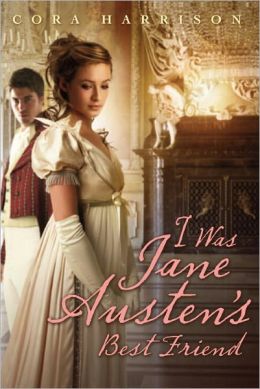I Was Jane Austen's Best Friend, by Cora Harrison
Feb 11
2013

According to the promotional sheet included with the review copy we received, Cora Harrison's YA novel I Was Jane Austen's Best Friend was written for “anyone who has imagined what it might have been like to be the best friend, cousin, and confidante of the one and only Jane Austen.” That is, um, a very specific fantasy, but I'm sure those readers are out there. Somewhere.
Told mostly via diary entries, I Was Jane Austen's Best Friend fictionalizes a dramatic moment in Jane Austen's childhood. As teenagers, Austen and her cousin Jenny Cooper were sent to a spartan girls' school in Southampton. When Jane fell seriously ill with a fever, Jenny—against the wishes of the headmistress—smuggled out a letter to Austen's mother, informing her of the danger and possibly saving Jane's life. Afterward, Jenny spent a few months with the Austen family at Steventon, enjoying her fun-loving cousins' company, experiencing the thrill of her first flirtations, and trying not to obsess over Captain Thomas Williams, the handsome young man who could ruin her reputation with a single careless comment.
This book is confusing. Setting aside the sensationalist title (which makes it sound like a True Crime confessional), 90% of the novel is a mildly entertaining slice-of-life story about a gentle, well-bred young girl's adventures during a few weeks spent with her lively Austen relatives. Unfortunately, Harrison decided to change several facts to suit her story, tweaking Jenny's age to more closely align it with Jane's, and depicting Jane's sister Cassandra as a sanctimonious prat whom both Jenny and Jane avoided, rather than Jane's closest friend. These changes make no sense, and the story would have worked nearly as well without them, so I have no idea why the the author chose to undermine her own credibility by messing with well-known elements of Austen's life.
What makes it even more of a bummer is the fact that I Was Jane Austen's Best Friend actually had a lot of potential. Jenny is a pleasant, thoughtful heroine, and Austen herself is portrayed as exactly the type of wild, funny girl one would imagine from her early writing. Harrison obviously did a ton of research, and while her writing style isn't particularly period-appropriate, I liked the sketches included in Jenny's diary entries. (The few non-diary sections were so infrequent each time I found myself wondering why the font had suddenly changed.) If Harrison had limited herself to telling a story that simply fictionalized history, rather than actively altering it, upped her period-speak, and packaged the whole thing as a novel about Jane Austen's little-known cousin*, there's no reason her book couldn't have found a much bigger audience than a handful of hardcore teenage Austen junkies.
*And changed the title, but that goes without saying.
Review based on publisher-provided copy.
Told mostly via diary entries, I Was Jane Austen's Best Friend fictionalizes a dramatic moment in Jane Austen's childhood. As teenagers, Austen and her cousin Jenny Cooper were sent to a spartan girls' school in Southampton. When Jane fell seriously ill with a fever, Jenny—against the wishes of the headmistress—smuggled out a letter to Austen's mother, informing her of the danger and possibly saving Jane's life. Afterward, Jenny spent a few months with the Austen family at Steventon, enjoying her fun-loving cousins' company, experiencing the thrill of her first flirtations, and trying not to obsess over Captain Thomas Williams, the handsome young man who could ruin her reputation with a single careless comment.
This book is confusing. Setting aside the sensationalist title (which makes it sound like a True Crime confessional), 90% of the novel is a mildly entertaining slice-of-life story about a gentle, well-bred young girl's adventures during a few weeks spent with her lively Austen relatives. Unfortunately, Harrison decided to change several facts to suit her story, tweaking Jenny's age to more closely align it with Jane's, and depicting Jane's sister Cassandra as a sanctimonious prat whom both Jenny and Jane avoided, rather than Jane's closest friend. These changes make no sense, and the story would have worked nearly as well without them, so I have no idea why the the author chose to undermine her own credibility by messing with well-known elements of Austen's life.
What makes it even more of a bummer is the fact that I Was Jane Austen's Best Friend actually had a lot of potential. Jenny is a pleasant, thoughtful heroine, and Austen herself is portrayed as exactly the type of wild, funny girl one would imagine from her early writing. Harrison obviously did a ton of research, and while her writing style isn't particularly period-appropriate, I liked the sketches included in Jenny's diary entries. (The few non-diary sections were so infrequent each time I found myself wondering why the font had suddenly changed.) If Harrison had limited herself to telling a story that simply fictionalized history, rather than actively altering it, upped her period-speak, and packaged the whole thing as a novel about Jane Austen's little-known cousin*, there's no reason her book couldn't have found a much bigger audience than a handful of hardcore teenage Austen junkies.
*And changed the title, but that goes without saying.
Review based on publisher-provided copy.
Posted by: Julianka
No new comments are allowed on this post.
Comments
No comments yet. Be the first!